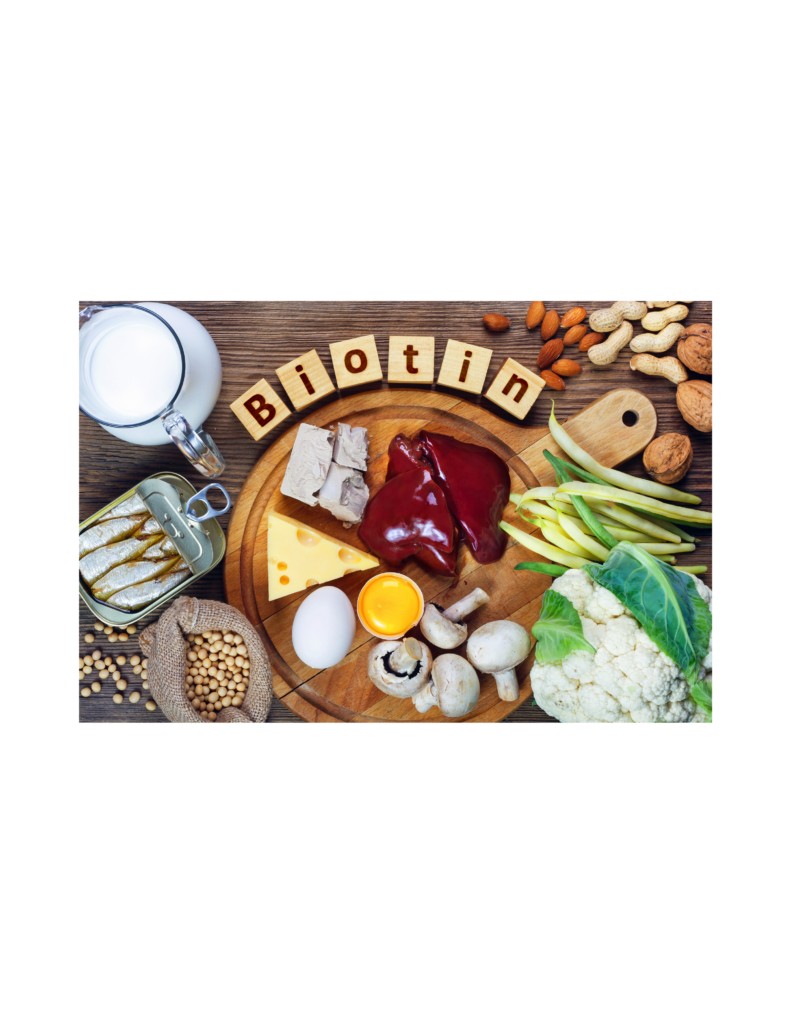
Biotin for Hair, Skin and Nails

What is biotin (vitamin B7)?
Biotin is an essential vitamin, now called Vitamin B7, that helps with the production of keratin and helps keep your skin, hair, eyes, liver, and nervous system healthy. Also known as vitamin H, it is one of the B complex vitamins that help the body convert food into energy.
The word “biotin” comes from the ancient Greek word “biotos,” which means “life” or “sustenance.” B vitamins, specifically biotin. Biotin is also a crucial nutrient Source during pregnancy, as it’s important for embryonic growth.
Benefits
Many believe biotin is helpful with the strengthening of your hair, skin, and nails. Biotin contains essential proteins that help with the development of your skin, nails, and hair. [i]
While the science is not proven via any well-formed clinical studies, there are some indications that this B vitamin may help your hair stay healthy, and it’s frequently recommended by dermatologists to help with hair loss.
“We find biotin to be very helpful for hair disorders,” says dermatologist Wilma Bergfeld, MD. “It also makes nails thicker, and oral biotin is exceedingly safe.” Does this mean it can also help your hair grow longer? Not quite.
What does the research say?
Some research, including a 2016 study, has shown that a lack of biotin in your system can lead to hair loss. This may lead you to consider increasing your intake of biotin for better hair growth. There are so many claims on this topic. For now, there isn’t enough research to definitively state that biotin can help grow hair. But biotin has been shown to help with preventing balding and hair loss.
However, it’s first important to know that there’s a difference between something that helps promote hair growth and something that helps prevent hair loss.
In fact, biotin is primarily used for alopecia — a condition that causes hair loss in all sexes. “Biotin helps maintain hair growth and helps with inflammation,” Dr. Bergfeld says. “The hair follicle, the skin, and the nails all benefit.”
In a small 2012 study, women with self-perceived thinning hair experienced an improvement in their hair’s overall thickness and growth after taking a multivitamin that contained biotin. But as the multivitamin contained other ingredients, it’s hard to attribute it completely to biotin.
Without robust research, is biotin something you should try? The good news is that taking biotin in reasonable amounts won’t do any harm.
How much should I take?
Most foods contain biotin in different amounts, so people usually get easily enough biotin from their normal diets. There is some evidence that diabetes may cause low biotin levels, as can pregnancy, or general malnourishment, and biotin supplements may help here. Otherwise, there’s no need. [ii]However, there are many the websites that tout biotin for hair growth, and they tend to recommend taking 2-5 milligrams (2,000-5,000 mcg) of biotin in supplement form each day. You can easily find many supplements sold under the name Biotin 5000, indicating a 5000 mcg (5 mg) size.
An RDA (Recommended Dietary Allowance) (see the fallacy of RDA guidance[iii]) does not exist for biotin because there is not enough evidence to suggest a daily amount needed by most healthy people. However, there is an AI (Adequate Intake) level, which is assumed to ensure nutritional adequacy to prevent disease.
The AI for biotin for men and women 19 years and older and for pregnant women is 30 micrograms daily. Lactating women need 35 micrograms daily. As you can see many products offer 100x the AI dosage.
A Tolerable Upper Intake Level (UL) is the maximum daily dose unlikely to cause adverse side effects in the general population. There is no UL for biotin due to a lack of reports showing negative effects from very high intakes.
Deficiencies
In 1927, Margarete Boas and Helen Parsons performed experiments on rats that showed that if they were fed large amounts of egg-white as their only protein source, they exhibited similar symptoms: dermatitis (skin rashes), alopecia (hair loss), and loss of muscular coordination. Boas coined the term ‘egg-white injury’ to describe this syndrome.
In 1940, György, working with Esmond Emerson Snell (photo, right), showed that chicks fed only with egg whites were deficient in biotin, despite biotin being present in their (egg-white) diet. They deduced that the egg white must contain another molecule which reacts with and removes biotin, or in some way sequesters it making it inactive.
This other molecule turned out to be aviden, a biotin-binding protein produced in the oviducts of birds, reptiles and amphibians and deposited in the whites of their eggs. When assayed, the mixture was found to have a low biotin concentration. The combination of aviden and B7 resulted in a highly efficient binding of the B7, removing the availability of biotin to the subject.
Natural Sources
Foods particularly rich in biotin are liver, eggs, bananas, yeast, avocado, peanuts, salmon, and sunflower seeds.


